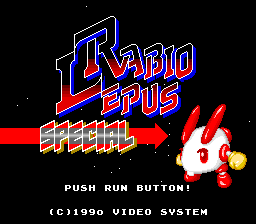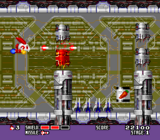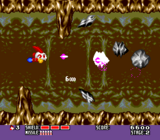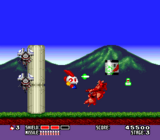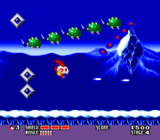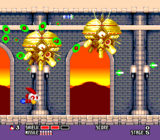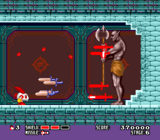Difference between revisions of "Rabio Lepus Special"
From NEC Retro
m (→Gameplay) |
|||
| Line 21: | Line 21: | ||
==Gameplay== | ==Gameplay== | ||
| − | Played from a horizontal perspective, the player controls Rabio, defeating waves of enemies and the occasional boss. Pressing {{II}} fires | + | Played from a horizontal perspective, the player controls Rabio, defeating waves of enemies and the occasional boss. Pressing {{II}} fires Rabio's main weapon, and holding the button allows for rapid fire. When close to an enemy, pressing {{II}} will make Rabio punch the enemy, which generally inflicts more damage than shooting them. Pressing {{I}} will make Rabio fire six missiles simultaneously that will home in on enemies, though he has a limited number of missiles. |
Rabio has a shield gauge which signifies the number of hits he can take. Running out of hit points on the shield gauge results in a life loss and the player must restart from a checkpoint. Getting a Game Over and using a credit to continue restarts the player from the beginning of the stage. | Rabio has a shield gauge which signifies the number of hits he can take. Running out of hit points on the shield gauge results in a life loss and the player must restart from a checkpoint. Getting a Game Over and using a credit to continue restarts the player from the beginning of the stage. | ||
Revision as of 16:14, 3 March 2022
| Rabio Lepus Special | ||||||||||
|---|---|---|---|---|---|---|---|---|---|---|
| System(s): PC Engine | ||||||||||
| Publisher: Video System | ||||||||||
| Developer: Minakuchi Engineering | ||||||||||
| Original system(s): Arcade boards | ||||||||||
| Genre: Shoot-'em-Up | ||||||||||
| Number of players: 1 | ||||||||||
| Official in-game languages: | ||||||||||
| ||||||||||
|
Rabio Lepus Special (ラビオレプス スペシャル) is a horizontal shoot-'em-up developed by Minakuchi Engineering and published by Video System for the PC Engine. It is an adaptation of the 1987 arcade game Rabio Lepus (known as Rabbit Punch in North America).
Contents
Story
In the year 6809, the princess of Bunnyland, Komomo Kitashirakawa, her sister Kotomi and their grandfather, King Taro Kitashirakawa, are kidnapped by an invading legion of monsters powerful in both science and witchcraft. It is up to Rabio (referred to as "Usagi" in the instruction manual), a robotic rabbit built for combat, to defeat the legion on a spaceship, an asteroid, and the enemy's planet, and save the royal family.
Gameplay
Played from a horizontal perspective, the player controls Rabio, defeating waves of enemies and the occasional boss. Pressing Ⅱ fires Rabio's main weapon, and holding the button allows for rapid fire. When close to an enemy, pressing Ⅱ will make Rabio punch the enemy, which generally inflicts more damage than shooting them. Pressing Ⅰ will make Rabio fire six missiles simultaneously that will home in on enemies, though he has a limited number of missiles.
Rabio has a shield gauge which signifies the number of hits he can take. Running out of hit points on the shield gauge results in a life loss and the player must restart from a checkpoint. Getting a Game Over and using a credit to continue restarts the player from the beginning of the stage.
Items
Items are found inside carrot capsules, which can be destroyed. Shooting a carrot capsule will make its contents fall downward, possibly falling inside terrain and becoming impossible to collect, while punching a capsule directly will make it appear on the spot. Flying directly into a capsule will knock it off the screen.
| Missile 1 (ミサイル1)[1] | |
|---|---|
| Increases missile stock by 1. | |
| Missile 3 (ミサイル3)[1] | |
| Increases missile stock by 3. | |
| Carrot[1] | |
| Refills one unit of the shield gauge. | |
| Double Carrot[1] | |
| Fully refills the shield gauge. | |
| Tokkuri[1] | |
| Awards bonus points. | |
| Ribbon (リボン)[2] | |
| Powers up Rabio's attacks - the main shot has a faster rapid fire rate, and the missiles can penetrate enemies. The ribbon will be dropped if Rabio takes damage, but it can be recollected before it scrolls off the screen. | |
| Tanuki no Tantan (たぬきのたんたん)[2] | |
| Grants temporary invincibility, allowing Rabio to defeat enemies simply by flying into them, though will be unable to use any other weapons for its duration. |
Stages
| Stage 1 | |
|---|---|
| Stage 1 combines the first four stages of the arcade game, set within the enemy spaceship. The stage starts in outer space before transitioning into the ship's interior. Kotomi is rescued at the end of this stage. | |
| Stage 2 | |
| The second stage is set within the asteroid base, combining stages 5 through 8 of the arcade game. The interiors of the base are filled with asteroids that will either float around or home in on Rabio. Taro is rescued at the end of this stage. | |
| Stage 3 | |
| This stage is based on the ninth stage of the arcade game, and sees Rabio arrive at the enemy's home planet. The boss at the end is the Black Dragon. | |
| Stage 4 | |
| This stage goes through the snowy wastelands of the enemy's home planet and is based on the tenth stage of the arcade game. The boss at the end is the Skip Elephant. | |
| Stage 5 | |
| Taking place within the halls of the enemy castle, which was the eleventh stage in the arcade game, this stage is primarily half of a boss rush featuring bosses previously fought in the first two stages. | |
| Stage 6 | |
| Based off the final stage of the arcade game, this version adds extra bosses to fight, including the Black Dragon from Stage 4 and the Fire Master. The final boss is fought by avoiding the demon's swords and shooting his legs, then shooting the wall behind him while he temporarily disappears to expose the real final boss. Once defeated, Komomo is rescued, and the game ends. |
History
Legacy
Video System would later go on to create the Sonic Wings series (known as Aero Fighters in the West) for arcades and other platforms, with Rabio Lepus influencing the direction of the series, even featuring characters from Rabio Lepus as secret characters or other miscellaneous cameos in the series. For example, Sonic Wings Special, released for the Sega Saturn, features Kotomi as a secret character piloting the Aka-Usagi, a ship based on the protagonist of Rabio Lepus. No Sonic Wings games were released for NEC systems.
Rabio would also cameo in other games developed by Video System, such as the 1997 Neo Geo puzzle game Gapporin (known as Pop'n Bounce in the West) and 1998 arcade quiz game SukuSuku Inufuku.
Versions
Rabio Lepus Special makes numerous changes from the 1987 arcade release, many of which aim to rebalance the game for a home console release. As listed in the above section, the first eight stages have been condensed into two stages, resulting in as half as many stages as the arcade game, and as a result of the stage changes various enemies and bosses were rearranged, and a few bosses have different attack patterns.
The health system is taken from the North American version of the arcade release, and instead of getting back up immediately after a death, the player has to restart stages from a checkpoint (or the beginning of the stage in the event of a Game Over), which arguably makes the game more punishing. What is perhaps the biggest omission from the arcade game is the ability to play a 2-player co-op game; as a result, Rabio Lepus Special supports only one player.
The princess' sister, Kotomi, was depicted as an adult wearing a Playboy-style bunny suit in the arcade game. In Rabio Lepus Special, she is changed to a child and wears the same rabbit costume as the king.
Production credits
- Programmer: K.Youzi, W.Hiroshi, Kin.Chan, K.Murata
- Debug: Hinasan, Akisama, Toru, N.Masaru
- Designer: Shinsuke Nakamura
- Music And S.E.: Naoki Itamura
- Director: Shinsuke Nakamura
- Presented by: Video System Co.,Ltd.
- The End
Magazine articles
- Main article: Rabio Lepus Special/Magazine articles.
Physical scans
| NEC Retro Average | ||||||||||||
|---|---|---|---|---|---|---|---|---|---|---|---|---|
|
| 76 | |
|---|---|
| Based on 3 reviews | |
| PC Engine, JP |
|---|
| <div style="margin:auto; max-width:Expression error: Unexpected < operator.px">
320x80px Cover
|
Technical information
ROM dump status
| System | Hash | Size | Build Date | Source | Comments | |||||||||
|---|---|---|---|---|---|---|---|---|---|---|---|---|---|---|
| ? |
|
393,216 | Card (JP) |
References
| Rabio Lepus Special | |
|---|---|
|
Main page | Comparisons | Maps | Hidden content | Magazine articles | Reception
| |
